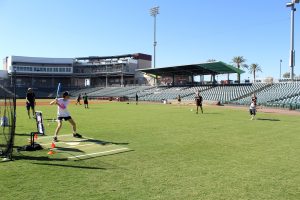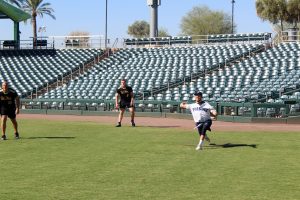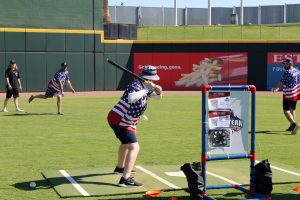- Slug: Sports-Wiffle Ball Popularity, 1,400 words.
- 4 photos available.
By Lucas Gordon
Cronkite News
GOODYEAR – When the world shut down three years ago, children across the country were often stuck in their houses for months due to COVID-19.
While many kids took time off from school and responsibilities to play video games, catch up on TV shows and sleep the days away, one 14-year-old mastermind took to his Scottsdale backyard to create one of the most popular sports leagues in the country.
Logan Rose, along with a group of his friends and his younger brother, turned the extended downtime into the Big League Wiffle. The four-team league started in Rose’s backyard, where the team recorded Wiffle ball games and posted them online.
Three years later, at 17 years old, Rose organizes the largest Wiffle ball tournament on the West Coast.
The fourth annual Western Wiffle Championships was held on Oct. 21 at Goodyear Ballpark, marking the first time since the tournament was held at Scottsdale Stadium for the first three years. A total of 27 Wiffle ball teams representing six states traveled to Arizona to participate in the yearly tournament.
“No one has a tournament to this scale at a spring training stadium, that’s just not a thing in Wiffle ball,” said Rose, a junior at Phoenix Country Day School. “Also, we’re young. We are still improving every day. Everything we do, it just keeps getting better. No one is as young as us doing what we’re doing.”
Getting involved in the game of Wiffle ball was easy for Rose and his family. When Rose and his brothers were starting to learn to play baseball, their father, Jason, built a small playing field in the family’s backyard to help teach his sons how to play.
When COVID started, Rose decided to convert the field for Wiffle ball. In a time of isolation, Jason was proud of his son for finding a way to pass the time.
“During COVID, Logan, like a lot of kids, was just struggling and looking for things to do. And he decided to start a Wiffle ball league. It became just a source of just great joy for parents as much because no one was socializing,” said Jason.
Playing competitive Wiffle ball runs in the Rose family. At a young age, Jason won the 1995 Wiffle Ball World Series.
“When I was a kid, to pass summer afternoons, we used to play Wiffle ball for hours and hours in the backyard. … (The World Series) was the high point of my athletic career, plus we beat future All-Star catcher, Paul Lo Duca,” Jason said.
The bond Jason and Rose created through the BLW is similar to the origins of an essential part of the sport – the Wiffle ball.
The history
The plastic perforated ball was created in the early 1950s when inventor David N. Mullany’s son and friends struggled to find a ball to play baseball that wouldn’t damage houses. The children had to resort to plastic golf balls since baseballs and tennis balls angered parents who were trying to protect their houses.
When the children were done playing with the plastic golf ball, they would come home with sore arms after attempting to throw curveballs all day. As a former semi-professional pitcher, Mullany knew soreness was not a good sign for 12-year-old arms.
Mullany developed the idea for the Wiffle ball after receiving inspiration from perfume packaging. Perfume bottles at the time came in plastic spheres that could pop apart into two halves.
Mullany took the perfume packaging and cut holes in one half of it. He then glued the half-sphere with holes in it with another half-sphere that was unaltered. The result was the birth of the Wiffle ball.
The new invention allowed Mullany’s son and friends to effortlessly throw curveballs without fear of hurting their arms or any property.
Fast forward 70 years, The Wiffle Ball Inc. is still being run by Mullany’s family through his grandsons, David J. and Stephen.
“Growing up it wasn’t expected for us to get into the business. We just fell into it through summer jobs, and the more we got into it the more we enjoyed it,” said David J., the president of The Wiffle Ball Inc.
Since its inception, The Wiffle Ball Inc., has sold millions of Wiffle balls and bats while playing a key part in the lives of many young baseball players.
“We’re thrilled with the people who choose our products and have fun with it,” David J. said. “Between me, my brother, my dad and our grandpa before that, we have put in a lot of our time into making sure we put out a good product at its highest quality.”
Thanks to the Mullany family, fathers and sons such as Jason and Rose have used Wiffle ball as a way to spend time together for decades.
With Jason backing Rose’s passion for the BLW, the league has grown to gain major national attention in the Wiffle ball community. The BLW has amassed over a combined 75,000 followers on its Instagram, YouTube and TikTok pages.
Rose and his friends travel the country to participate in other Wiffle ball tournaments, gaining connections with other well-known leagues and their players.
Growing popularity
The connections that Rose makes while he travels the country helped make this year’s Western Wiffle Championship field the largest in its four-year history.
Teams from New York, New Jersey, California and Nevada traveled to Goodyear to participate in this year’s event. Rosters are full of players ranging in age from high schoolers to middle-aged men.
Some of these teams call in people from other parts of the country to fill roster spots if needed. That is how David “Toast” Wood found himself on the Phenoms team from New York.
Wood, who gained the nickname “Toast” from a tattoo he has on his right arm of a piece of toast throwing a Wiffle ball off a pitcher’s mound, has played Wiffle ball competitively for 15 years. Throwing a plastic ball that weighs a tenth of a pound at 90 plus miles per hour has taken a toll on his arm and led to UCL reconstruction surgery on the same arm that has the toast tattoo.
Despite being on his “second elbow,” the Georgia native still plays Wiffle ball with the competitive spirit of any other athlete.
“We didn’t fly out here just to play for fun. We’re out here to win. We all like to win, we’re all competitors,” Wood said.
Competition in Wiffle ball intensifies as adrenaline starts to take over. Some of the best Wiffle ball pitchers can reach velocities over triple digits. A regulation Wiffle ball mound is situated 45 feet away from home plate. From that distance, throwing a Wiffle ball at 90 miles per hour is the MLB equivalent of a 111-mph fastball.
Since the ball is completely white, batters are unable to read the spin of the ball and forced to guess the way the pitch is moving based on the pitcher’s arm slot.
Wood and his team had no issues hitting the ball as they rolled through the competition into the championship game.
Unfortunately for Wood and the Phenoms, they took second place in the competitive division as Arizona’s Wifflezilla won its fourth consecutive Western Wiffle Championship trophy.
Despite the disappointing loss for Wood, the Western Wiffle Championship had a successful day at Goodyear ballpark.
“We have a bunch of people from across the country here. They’re spending a lot of money and time to get out here. We just hope they have a fun day,” Rose said.
Most Wiffle ball tournaments are held in the northeast, so the season ends much earlier due to the weather. With the tournament being held in Arizona, people are willingly coming to the West Coast to extend their Wiffle ball season.
“This is the best tournament west of the Mississippi. The National Championship (in York, Pennsylvania) recruits because of the proximity because there are more teams,” Jason said. “But the weather is always really sketchy. It was 58 degrees and rainy when we were there, so you can’t get 100 and sunny in October over there.”
Before the pandemic, the chances of competitive Wiffle ball being played in October were very slim. Thanks to Rose and his fellow supporters, the game is growing on the West Coast to places never seen before as he looks to outdo himself in 2024.
For more stories from Cronkite News, visit cronkitenews.azpbs.org.



